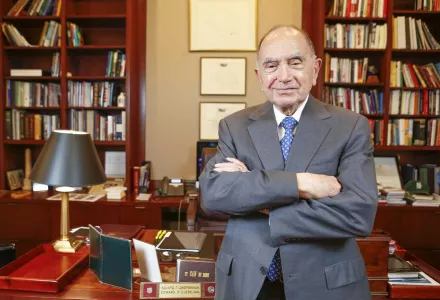Throughout his diplomatic career, Ambassador Edward P. Djerejian has been involved in conflict resolution in the Arab World, including Israel/Palestine. For three quarters of a century, the Palestinian issue has been the focal point of conflict in the region. Successive American administrations have dedicated significant effort to trying to solve the problem, and yet the crisis not only persists, but deepens. In this study group, we explore the roots of this conflict, the human toll it has taken on both the Arab and Jewish inhabitants of this land, and potential solutions to it. This will be an interactive study group emphasizing discussion in order to best understand the complex issues involved and potential approaches to a resolution.
The study group will span five sessions during the Spring 2023 semester, lasting from noon until 1:30 pm on Wednesdays. Enrollment will consist of up to 30 students from the Harvard community, with particular emphasis on Harvard Kennedy School and Harvard College affiliates. The format will include reading assignments and opening presentations at each session by Ambassador Djerejian, followed by an interactive dialogue with the students. The last two sessions will focus on analytic and critical discussion of options for resolution of the Israeli-Palestinian conflict and, alternatively, the implications of the problematic status quo. A final paper will be published internally summarizing the themes of the study group and suggested options to settle the conflict.
In addition to the study group and throughout Ambassador Djerejian’s tenure as a senior MEI Fellow, there will be supplementary lectures and meetings centered on significant developments in the broader Middle East region and on students’ expressed interests. The first event will take place on February 6, 2023, which will be a discussion with Ambassador Djerejian moderated by MEI director Dr. Tarek Masoud focusing on Ambassador Djerejian’s diplomatic career and United States Middle East policy. This event will also serve as Ambassador Djerejian’s official welcome to the Harvard Kennedy School’s Belfer Center Middle East Initiative and the Harvard community.
Session # 1: Historical Context of the Israeli-Palestinian Conflict (February 22, 2023)
This first session will review the historical context of the Israeli-Palestinian conflict, including the legacy of the Ottoman Empire and the post-WWI settlements following the Treaty of Versailles and the Sykes-Picot agreements, which were part of the colonial redrawing of the borders of the contemporary Middle East. Understanding Israel’s creation in the post-colonial period (1917-1948) will provide basic context leading to the current situation. The relevant reading for this session will include David Fromkin’s seminal book A Peace to End All Peace Creating the Modern Middle East (1998).
Session #2: Paradigms of a Solution (March 1, 2023)
In this session, we will conduct a summary overview of past negotiations to resolve the Israeli-Palestinian conflict pointing out successes and failures. We will analyze what lessons can be learned from these negotiations and define which stakeholders favored which approaches throughout the peace process.
Session #3: The Current Situation—The Israeli Occupation of the Palestinian Territories as a “Frozen Conflict” (March 22, 2023)
In this session we will evaluate the current problematic status quo of the Israeli-Palestinian conflict, incorporating authoritative analyses of the core issues and divisions from both sides. We will analyze the internal divisions within both Palestinian and Israeli society that impact any peace negotiations, including Bibi Netanyahu’s return to power as head of the most right-wing coalition in Israel and the stasis Palestinian Authority under the long-term leadership of Mohammad Abbas and the Fatah-Hamas rivalry for power. Externally, we will analyze the impact of players on conflict resolution, including the United States, the EU, Russia, China, the UN, and others. The impact of the Abraham Accords will also be discussed.
Session # 4: Prospects for a Peaceful Settlement of the Israeli-Palestinian Conflict (March 29, 2023)
At this session, we will discuss various options and proposals for a settlement as a prelude to our last session exploring the way forward. Some peacemaking scenarios include the Two State Solution (TSS), a One State Solution with equal rights for both Israelis and Palestinians, a One State Solution with unequal rights giving preference to Israeli Jewish citizens, or some form of Confederation, including between Jordan and Palestine, or with Israel, Jordan, and Palestine.
Session #5: Final Meeting (April 12, 2023)
This final session will recapitulate the study group’s core themes and conclusions and discuss students' recommendations for the way forward in reaching a political settlement of the Israeli-Palestinian conflict and the implications of the problematic status quo.
A student group will be formed under the direction of the Research Assistant to produce an internal working draft paper of findings to be reviewed by Ambassador Djerejian.

